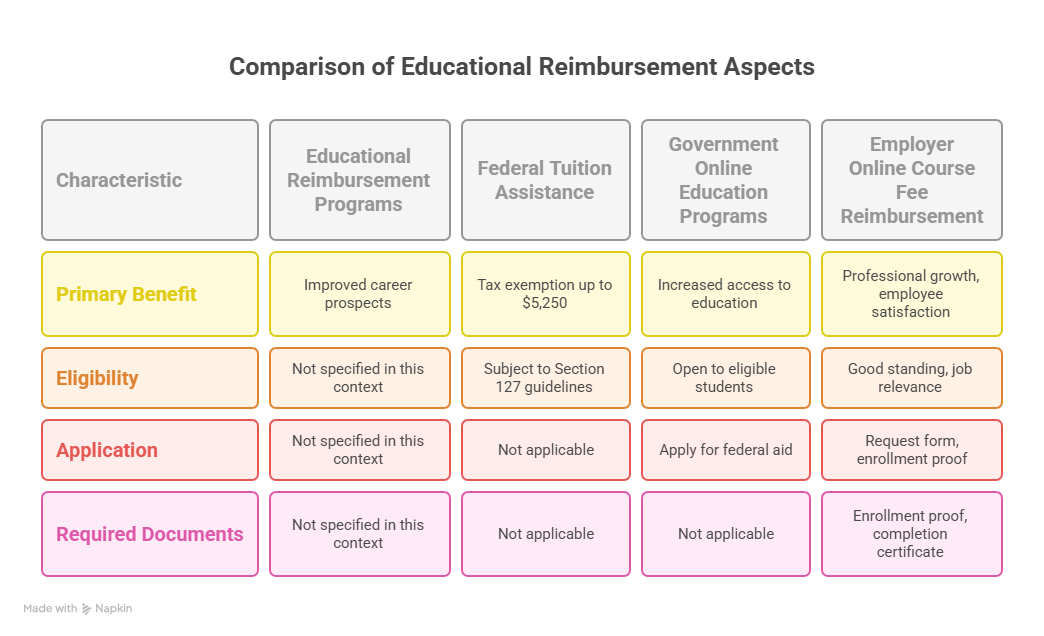Did you know that corporations like IBM and Intel use tuition reimbursement programs to spend millions of dollars a year on staff education? This large investment helps the company grow overall in addition to improving the skills of its employees.
Comprehending tuition reimbursement policies has become essential for both government agencies and employers as the labor market continues to change. These regulations are essential for developing a competent workforce and encouraging staff advancement.
This article will examine the rules pertaining to tuition reimbursement, offering insights into how employer and governmental regulations can promote the training and development of staff members.
Understanding Online Course Fee Reimbursement Policy and Government Guidelines
Understanding government regulations and reimbursement policies is becoming more and more crucial as online learning expands. Understanding these policies is essential to optimizing the benefits of the online course fee reimbursement policy, which is intended to assist people in pursuing higher education.
What Constitutes an Online Course Fee Reimbursement
The financial aid given to people to cover the expenses of online courses is known as an online course fee reimbursement. Government programs or employers may provide this reimbursement. Tuition fees, course materials, and occasionally other costs are usually the main elements.
Benefits of Educational Reimbursement Programs
Programs for educational reimbursement have many advantages, such as improved career opportunities, higher employee retention rates for employers, and a workforce with greater skill. Both employers and employees benefit from these programs.
| Benefits | Description |
|---|---|
| Career Advancement | Enhanced career prospects through further education. |
| Employee Retention | Increased job satisfaction and reduced turnover rates. |
| Skilled Workforce | A more skilled and competitive workforce. |
Federal Tax Implications of Tuition Assistance
Tuition assistance’s effects on federal taxes must be taken into account. In general, Section 127 of the Internal Revenue Code exempts tuition assistance up to $5,250 from taxes.Any sums over this cap could be regarded as taxable income.
Government Programs Supporting Online Education
The government provides a number of initiatives to encourage online learning, such as federal student aid programs and the GI Bill. The goal of these initiatives is to lower the cost and increase access to education.
GI Bill and Military Education Benefits
Veterans of the armed forces can receive educational benefits through the GI Bill, which covers tuition and other costs.For veterans making the transition to civilian life, this support is essential.
Federal Student Aid Options
To assist students in their academic endeavors, the federal government offers grants and loans as forms of student aid. Making educated decisions about how to pay for education requires an understanding of these options.
Employer Online Course Fee Reimbursement Policy Implementation
Employers are realizing that covering the cost of online courses as part of benefits for staff members improves professional growth and employee satisfaction.
Common Eligibility Requirements
Employees normally need to fulfill specific eligibility requirements, like being in good standing, having a minimum length of service, and matching the course to their job role or career development, in order to be eligible for reimbursement of online course fees.
Eligibility requirements for reimbursement frequently consist of:
- Status of employment (full-time, part-time)
- Duration of service
- Course relevance to the worker’s position
Reimbursement Application Process
Usually, submitting a request form, supplying documentation of course enrollment, and occasionally providing a brief explanation of the course are required steps in the application process for online learning cost reimbursement.
Employers can expedite this process by using online portals, which will make it simpler for workers to apply and monitor the status of their reimbursements.
Documentation and Proof of Completion
Employees must typically present documentation, such as course fee receipts and proof of course completion, in order to be reimbursed.
| Document Type | Description |
|---|---|
| Course Enrollment Proof | Confirmation of course enrollment |
| Course Completion Certificate | Proof that the employee completed the course |
| Receipts for Course Fees | Proof of payment for the course |

Negotiating Better Reimbursement Terms with Employers
By proving that the course is beneficial to their position and the business, employees can bargain for better reimbursement terms.
This could entail outlining a plan for applying the new skills or talking about how the course fits with the objectives of the business.
Conclusion
Anyone pursuing online education must comprehend the process for reimbursement of course fees. People can maximize these programs and continue their education without incurring heavy financial burdens if they understand the rules established by the government and their employers.
Programs for educational reimbursement have many advantages; in addition to providing financial aid, they also foster a more skilled and driven workforce. As previously mentioned, these policies are heavily influenced by federal tax implications and government initiatives that promote online learning.
Understanding the eligibility requirements, reimbursement application procedure, and required documentation is crucial for making the most of online course fee reimbursement. People can easily navigate these programs and optimize their benefits by doing this.
People can improve their career prospects and help create a workforce that is more educated and skilled by being aware of and taking advantage of online course fee reimbursement policies.
FAQ
What is the online course fee reimbursement policy?
Employers and governmental organizations offer the online course fee reimbursement policy as a way to compensate staff members or individuals for the expenses incurred when enrolled in online courses.
Who is eligible for online course fee reimbursement?
Employers and government programs have different eligibility requirements, but in general, people must be employed or fulfill certain service requirements in order to be eligible for reimbursement.
How do I apply for online course fee reimbursement?
Usually, to apply, you must fill out a reimbursement application and include supporting documentation like receipts, proof of payment, and certificates of course completion.
What documentation is required for the reimbursement process?
A certificate of course completion, invoices or receipts for the course fees, and evidence of payment are typically required documents.
Are there any tax implications for tuition assistance or reimbursement?
Yes, tuition reimbursement or assistance may have federal tax ramifications. To comprehend the precise tax ramifications, it is advised to speak with a tax expert.
Can I negotiate better reimbursement terms with my employer?
Yes, by talking about your needs and the advantages of the program for both you and your employer, you can work out better terms for reimbursement.
What government programs support online education and offer reimbursement?
Online education can be supported by government programs that provide financial aid or reimbursement, such as the GI Bill and federal student aid options.
How does the GI Bill support online education?
For qualified veterans and active military personnel, the GI Bill offers tuition and fee reimbursement for online education.
What are the common eligibility requirements for employer reimbursement programs?
Being a full-time or part-time employee, finishing a specific amount of service, and fulfilling particular course or program requirements are typical eligibility requirements.




